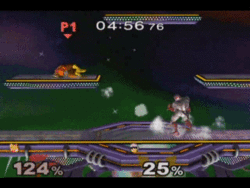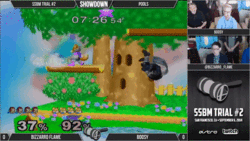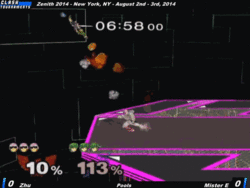Moonwalk: Difference between revisions
mNo edit summary |
mNo edit summary |
||
| (102 intermediate revisions by 64 users not shown) | |||
| Line 1: | Line 1: | ||
{{ArticleIcons|melee=y|unofficial=y}} | |||
[[File:Moonwalking Melee.gif|thumb|250px|{{SSBM|Captain Falcon}} moonwalking in ''Melee''.]] | |||
In ''[[Super Smash Bros. Melee]]'', the '''moonwalk''' is a technique that involves sliding backwards during in the [[initial dash]] animation. Discovered by the smasher {{Sm|Mr.C}}, the technique is named after [[wikipedia:Moonwalk (dance)|the signature dance move]] of famed pop singer {{s|wikipedia|Michael Jackson}}. | |||
==Performing the moonwalk== | |||
Moonwalking is achieved by tilting the [[control stick]] backwards while dashing, which can make the character move backwards with maximum dash speed when performed correctly. Because tilting the control stick back too fast will result in a dash back, the control stick must be lightly tilted back for at least two frames before tilting straight back. A convenient way to do this is to first go to the lower back diagonal notch for two or more frames before tilting straight back. It does not matter if the control stick goes through the neutral zone or points down at any time during the dash animation, so the notch can be reached in a straight line or in a circular motion. After the moonwalk, the character can still continue sliding a significant distance, for low traction characters often further than the distance traveled back during the dash animation. | |||
Alternatively, it's possible to moonwalk by very quickly smashing the control stick backwards within the first three frames of a dash, or by tilting back on frame 3 and holding fully back on the next frame. This only works for forward dashes, not for turnaround dashes. This variation yields slightly longer moonwalks and is thus considered a perfect moonwalk, but the frame precision required is exceptionally difficult, and so outside of [[TAS]] scenarios it is never seen in practice. | |||
The character's velocity before the dash is added to the character's initial dash speed, thus any velocity in the moonwalk direction can greatly increase the moonwalk length. Methods of gaining initial speed for the moonwalk include walking, wavedashing forward or backward, and using another moonwalk. This way multiple moonwalks can be stringed together to build up enough momentum to reach the full backwards velocity, which is often not possible with a single moonwalk from a standstill. All characters in the game can moonwalk, but a majority of the characters require this extra initial velocity to actually move back past the moonwalk starting position. | |||
The [[Bunny Hood]] item increases the dash acceleration and gives every character a decent moonwalk range. | |||
==Variations of the moonwalk== | |||
There are two documented variations of the moonwalk: the sticky walk and the Charlie walk. | |||
===Sticky walk=== | |||
[[File:Sticky walking Melee.gif|thumb|250px|Smasher {{Sm|Bizzarro Flame}} sticky walking in ''Melee'' during a tournament match.]] | |||
The sticky walk starts with the same inputs as the moonwalk, but once negative or sufficiently small velocity is reached, the control stick can be put in neutral to reach zero velocity, and then held forward to transition to the running animation, where the character slowly gains speed again. Because the speed of the animation is directly proportional to the speed of the character's movement across the stage, the character's animation slows to a stop when the velocity is close to zero and then resumes in slow motion until the normal running speed is reached. | |||
===Charlie walk (Boost Walk)=== | |||
[[File:Charlie walking Melee.gif|thumb|250px|Smasher {{Sm|Zhu}} Charlie walking in ''Melee'' during a tournament match.]] | |||
The Charlie walk, discovered in 2006 by {{Sm|Fuzzyness}} (whose real name is Charles), is an extension of the sticky walk. The technique is executed by performing a sticky walk and then initiating the turnaround (called "TURNRUN" in the animation debug overlay) animation by moving the control stick in the direction opposite the character is facing. | |||
If one wants to string multiple Charlie walks into each other, the player must reverse the direction of the control stick on the frame that the turnaround animation ends. This initiates a dash, which one then must use to begin another moonwalk to repeat the entire process. If the player were to reverse the control stick earlier, the turnaround animation would end in a pivot. If the player were to reverse the control stick any later, the turnaround animation would end in a run and then another turnaround in the opposite direction. | |||
# | Because the Charlie walk adds horizontal speed during the turnaround animation, execution of successive Charlie walks produces more backwards momentum faster compared to a string of perfect moonwalks, thus enabling players to utilize this technique even for characters whose regular moonwalks are considered nonviable. | ||
# | |||
# | The Charlie walk is often used as a flashy show-off move, considered technical by top players. It was featured in the first gameplay clip of [https://www.youtube.com/watch?v=xwDHs6UXgR8&t=11s Perfect Dark], a Fox combo video considered to be an exhibition of the most technical gameplay humanly possible. | ||
# | |||
# | Other examples of the Charlie walk: | ||
# | * [https://www.youtube.com/watch?v=p3tgPl1fgj4 Original video from 2006 where Fuzzyness showcases "The Charlie."] | ||
# | |||
# | * [https://www.youtube.com/watch?v=7qnfNBVic0U&t=1m21s Zhu Charlie walking across Final Destination after taking a stock of his opponent] | ||
# | |||
# | * [https://www.youtube.com/watch?v=7qnfNBVic0U&t=1m42s Zhu Charlie walking in a similar situation] | ||
# | |||
# | * [https://www.youtube.com/watch?v=s3AgqTQrwE0 One player's demonstration of their Charlie walk] | ||
# [[ | |||
==Use in [[competitive play]]== | |||
The moonwalk acts as a generally situational technique in the competitive metagame, owing to the greater prevalence of [[wavedash]]ing. In most cases, the moonwalk is primarily used for extra flash by the smasher. | |||
Moonwalking, however, is not a completely useless technique. The technique can be used in [[mindgame]]s in order to mix up movement or otherwise bait opponents, adding a degree of unpredictability to a smasher's playstyle. Cautious smashers can also attempt to use the moonwalk as to more efficiently [[edgehog]] instead of using a [[wavedash]]. | |||
By principle, the moonwalk allows characters to slide backwards while the game recognizes them as standing. This property gives the moonwalking character a deceiving grab hitbox which results in the character being able to grab behind himself/herself. Characters from Captain Falcon to even Peach can see the effects (excluding tether grab characters). | |||
Due to his powerful edgeguarding game and long moonwalk, Captain Falcon derives the most applications from moonwalking, as the backward momentum from moonwalking can allow him to slide off the stage in order to intercept [[recover]]ing opponents with an aerial attack. In some cases, this can actually act as a superior alternative to going offstage with other techniques, as the moonwalk can move Captain Falcon much farther offstage and will also allow Falcon to retain his double jump, allowing for safer recovery. | |||
==Moonwalking distance== | |||
The moonwalk is most noticeable when used by {{SSBM|Captain Falcon}}, though some other characters, like {{SSBM|Link}} and {{SSBM|Mewtwo}}, also have rather noticeable moonwalks. The following characters can moonwalk without needing to walk in the opposite direction, ranked by distance: | |||
#{{SSBM|Captain Falcon}} | |||
#{{SSBM|Link}} | |||
#{{SSBM|Young Link}} | |||
#{{SSBM|Mewtwo}} | |||
#{{SSBM|Yoshi}} | |||
#{{SSBM|Ganondorf}} | |||
#{{SSBM|Peach}} | |||
#{{SSBM|Zelda}} | |||
#{{SSBM|Bowser}} | |||
#{{SSBM|Samus}} | |||
#{{SSBM|Kirby}} | |||
Assuming the extra step is added and the character is wearing a Bunny Hood, the distances can be listed via the following list: | |||
#Captain Falcon | |||
#Mewtwo | |||
#Young Link | |||
#Link | |||
#Yoshi | |||
#Ganondorf | |||
#Bowser | |||
#Peach | |||
#{{SSBM|Sheik}} | |||
#Kirby | |||
#Samus | |||
#{{SSBM|Luigi}} | |||
#{{SSBM|Donkey Kong}} | |||
#Zelda | |||
#{{SSBM|Falco}} | |||
#{{SSBM|Fox}} | |||
#{{SSBM|Pichu}} | |||
#{{SSBM|Pikachu}} | |||
#{{SSBM|Roy}} | |||
#{{SSBM|Dr. Mario}} | |||
#{{SSBM|Mario}} | |||
#{{SSBM|Jigglypuff}} | |||
#{{SSBM|Ness}} | |||
#{{SSBM|Marth}} | |||
#{{SSBM|Ice Climbers}} | |||
#{{SSBM|Mr. Game & Watch}} | |||
==External links== | |||
*[https://www.youtube.com/watch?v=tmdDsfpJ9sE A video showing all characters moonwalking to the edge.] | |||
*[https://www.youtube.com/watch?v=vG4-WSm4dgk Another video showing all characters moonwalking to the edge.] | |||
*[https://www.youtube.com/watch?v=Eih3o88sonc A video showing all characters moonwalking and stickywalking, using Bunny Hoods.] | |||
[[Category:Techniques (SSBM)]] | |||
[[Category:Advanced techniques]] | |||
[[Category:Slide techniques]] | |||
Latest revision as of 16:33, May 14, 2024

In Super Smash Bros. Melee, the moonwalk is a technique that involves sliding backwards during in the initial dash animation. Discovered by the smasher Mr.C, the technique is named after the signature dance move of famed pop singer Michael Jackson.
Performing the moonwalk[edit]
Moonwalking is achieved by tilting the control stick backwards while dashing, which can make the character move backwards with maximum dash speed when performed correctly. Because tilting the control stick back too fast will result in a dash back, the control stick must be lightly tilted back for at least two frames before tilting straight back. A convenient way to do this is to first go to the lower back diagonal notch for two or more frames before tilting straight back. It does not matter if the control stick goes through the neutral zone or points down at any time during the dash animation, so the notch can be reached in a straight line or in a circular motion. After the moonwalk, the character can still continue sliding a significant distance, for low traction characters often further than the distance traveled back during the dash animation.
Alternatively, it's possible to moonwalk by very quickly smashing the control stick backwards within the first three frames of a dash, or by tilting back on frame 3 and holding fully back on the next frame. This only works for forward dashes, not for turnaround dashes. This variation yields slightly longer moonwalks and is thus considered a perfect moonwalk, but the frame precision required is exceptionally difficult, and so outside of TAS scenarios it is never seen in practice.
The character's velocity before the dash is added to the character's initial dash speed, thus any velocity in the moonwalk direction can greatly increase the moonwalk length. Methods of gaining initial speed for the moonwalk include walking, wavedashing forward or backward, and using another moonwalk. This way multiple moonwalks can be stringed together to build up enough momentum to reach the full backwards velocity, which is often not possible with a single moonwalk from a standstill. All characters in the game can moonwalk, but a majority of the characters require this extra initial velocity to actually move back past the moonwalk starting position.
The Bunny Hood item increases the dash acceleration and gives every character a decent moonwalk range.
Variations of the moonwalk[edit]
There are two documented variations of the moonwalk: the sticky walk and the Charlie walk.
Sticky walk[edit]

The sticky walk starts with the same inputs as the moonwalk, but once negative or sufficiently small velocity is reached, the control stick can be put in neutral to reach zero velocity, and then held forward to transition to the running animation, where the character slowly gains speed again. Because the speed of the animation is directly proportional to the speed of the character's movement across the stage, the character's animation slows to a stop when the velocity is close to zero and then resumes in slow motion until the normal running speed is reached.
Charlie walk (Boost Walk)[edit]

The Charlie walk, discovered in 2006 by Fuzzyness (whose real name is Charles), is an extension of the sticky walk. The technique is executed by performing a sticky walk and then initiating the turnaround (called "TURNRUN" in the animation debug overlay) animation by moving the control stick in the direction opposite the character is facing.
If one wants to string multiple Charlie walks into each other, the player must reverse the direction of the control stick on the frame that the turnaround animation ends. This initiates a dash, which one then must use to begin another moonwalk to repeat the entire process. If the player were to reverse the control stick earlier, the turnaround animation would end in a pivot. If the player were to reverse the control stick any later, the turnaround animation would end in a run and then another turnaround in the opposite direction.
Because the Charlie walk adds horizontal speed during the turnaround animation, execution of successive Charlie walks produces more backwards momentum faster compared to a string of perfect moonwalks, thus enabling players to utilize this technique even for characters whose regular moonwalks are considered nonviable.
The Charlie walk is often used as a flashy show-off move, considered technical by top players. It was featured in the first gameplay clip of Perfect Dark, a Fox combo video considered to be an exhibition of the most technical gameplay humanly possible.
Other examples of the Charlie walk:
Use in competitive play[edit]
The moonwalk acts as a generally situational technique in the competitive metagame, owing to the greater prevalence of wavedashing. In most cases, the moonwalk is primarily used for extra flash by the smasher.
Moonwalking, however, is not a completely useless technique. The technique can be used in mindgames in order to mix up movement or otherwise bait opponents, adding a degree of unpredictability to a smasher's playstyle. Cautious smashers can also attempt to use the moonwalk as to more efficiently edgehog instead of using a wavedash.
By principle, the moonwalk allows characters to slide backwards while the game recognizes them as standing. This property gives the moonwalking character a deceiving grab hitbox which results in the character being able to grab behind himself/herself. Characters from Captain Falcon to even Peach can see the effects (excluding tether grab characters).
Due to his powerful edgeguarding game and long moonwalk, Captain Falcon derives the most applications from moonwalking, as the backward momentum from moonwalking can allow him to slide off the stage in order to intercept recovering opponents with an aerial attack. In some cases, this can actually act as a superior alternative to going offstage with other techniques, as the moonwalk can move Captain Falcon much farther offstage and will also allow Falcon to retain his double jump, allowing for safer recovery.
Moonwalking distance[edit]
The moonwalk is most noticeable when used by Captain Falcon, though some other characters, like Link and Mewtwo, also have rather noticeable moonwalks. The following characters can moonwalk without needing to walk in the opposite direction, ranked by distance:
Assuming the extra step is added and the character is wearing a Bunny Hood, the distances can be listed via the following list:
- Captain Falcon
- Mewtwo
- Young Link
- Link
- Yoshi
- Ganondorf
- Bowser
- Peach
- Sheik
- Kirby
- Samus
- Luigi
- Donkey Kong
- Zelda
- Falco
- Fox
- Pichu
- Pikachu
- Roy
- Dr. Mario
- Mario
- Jigglypuff
- Ness
- Marth
- Ice Climbers
- Mr. Game & Watch